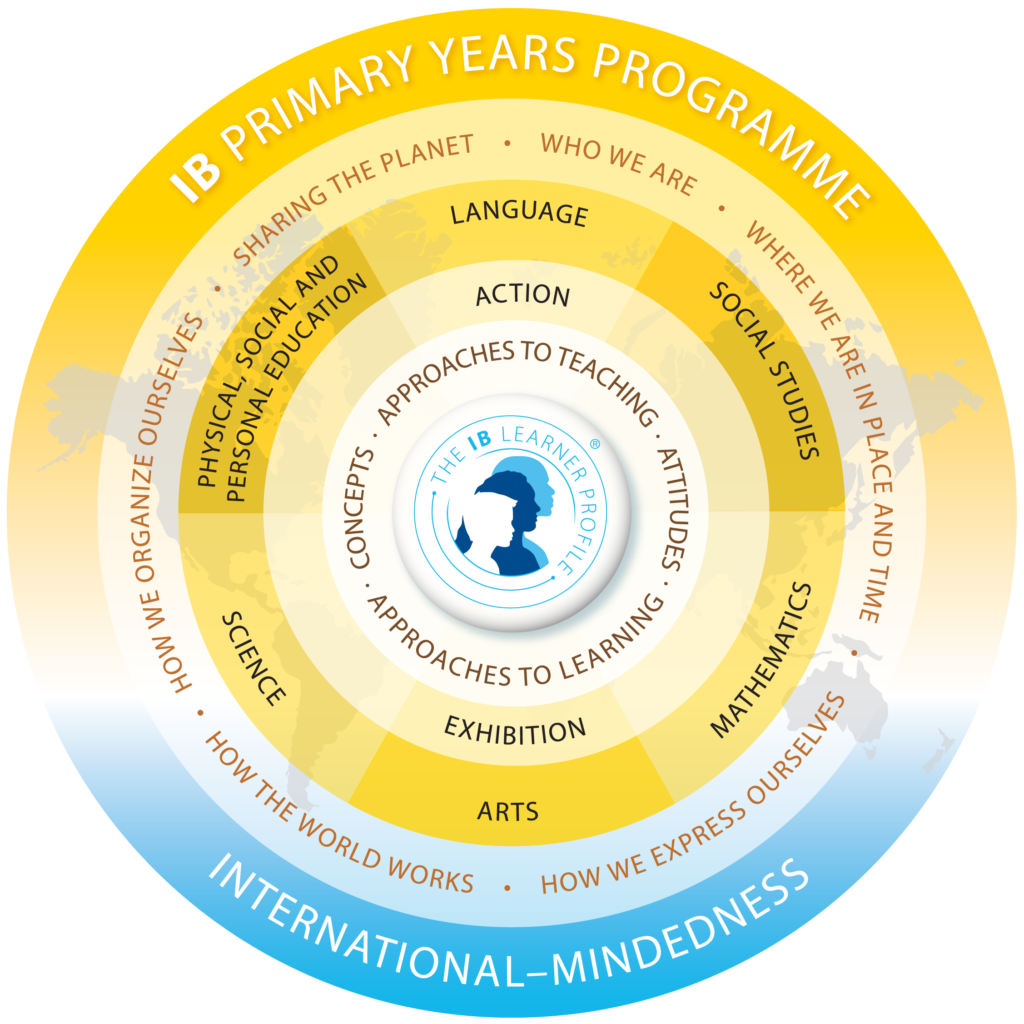IB LEARNER

Profile
IBLearner
The aim of all IB programs is to develop internationally minded people who, recognizing their common humanity and shared guardianship; of the planet, help to create a better and more peaceful world.
Inquirers
They develop their natural curiosity. They acquire the skills necessary to conduct inquiry and research and show independence in learning. They actively enjoy learning and this love of learning will be sustained throughout their lives.
Knowledgeable
They explore concepts, ideas and issues that have local and global significance. In so doing, they acquire in-depth knowledge and develop understanding across broad and balanced range of disciplines.
Thinkers
They exercise initiative in applying thinking skills and creatively to recognize and approach complex problems, and make reasoned, ethical decisions.
Communications
They understand and express ideas and information confidently and creatively in more than one language and in a variety of modes of communication. They work effectively and willingly in collaboration with others.
Principled
They act with integrity and honesty, with a strong sense of fairness, justice and respect for the dignity of the individual, groups and communities. They take responsibility for their own actions and the consequences that accompany them.
Open-minded
They understand and appreciate their own cultures and personal histories, and are open to the perspectives, values and traditions of other individuals and communities. They are accustomed to seeking and evaluating a range of points of view, and are willing to grow from the experience.
Caring
They show empathy, compassion and respect towards the needs and feelings of others. They have a personal commitment to service, and act to make a positive difference to the lives of others and to the environment
Risk-takers
They approach unfamiliar situations and uncertainty with courage and forethought, and have the independence of spirit to explore new roles, ideas and strategies. They are brave and articulate in defending their beliefs.
Balanced
They understand the importance of intellectual, physical and emotional balance to achieve personal well-being for themselves and others.
Reflective
They give thoughtful consideration to their own learning and experience. They are able to assess and understand their strengths and limitations in order to support their learning and personal development
The PYP curriculum model constitutes of –
The school has a well designed transdisciplinary programme of inquiry based on six themes that are cognitively and developmentally appropriate for young learners as they have enduring significance and students can identify with them.
The PYP curriculum model constitutes of –
| Transdisciplinary Themes | Descriptions |
| Who we are | An inquiry into the nature of the self; beliefs and values; personal, physical, mental, social and spiritual health; human relationships including families, friends, communities and cultures; rights and responsibilities; what it means to be human. |
| Where we are in Place and Time | An inquiry into orientation in place and time; personal histories; homes and journeys; the discoveries, explorations and migrations of humankind; the relationships between and the interconnectedness of individuals and civilizations, from local and global perspectives. |
| How we express ourselves | An inquiry into the ways in which we discover and express ideas, feelings, nature, culture, beliefs and values; the ways in which we reflect on, extend and enjoy our creativity; our appreciation of the aesthetic. |
| How the World Works | An inquiry into the natural world and its laws; the interaction between the natural world (physical and biological) and human societies; how humans use their understanding of scientific principles; the impact of scientific and technological advances on society and on the environment. |
| How we Organise Ourselves | An inquiry into the interconnectedness of human-made systems and communities; the structure and function of organizations; societal decision-making; economic activities and their impact on humankind and the environment. |
| Sharing the Planet | An inquiry into rights and responsibilities in the struggle to share finite resources with other living things; communities and the relationships within and between them; access to equal opportunities; peace and conflict resolution. |
These globally and socially driven themes provide a starting point from which students can examine issues and opportunities as they are being experienced in the real world. The themes are explored through open ended central ideas which are engaging, relevant, challenging and significant.
The inquiry based approach allows the students to be actively involved in their learning by developing demonstrating skills and attributes of the learner profile. Carefully considered resources such as technology, the library, books, design material, manipulatives, arts and science supplies and more contribute to the depth of the inquiry. Successful inquiries lead to responsible student actions in a variety of situations encountered through the curriculum.
In IB PYP the teaching is:-
![]() Based on inquiry: A strong emphasis is placed on students finding their own information and constructing their own understandings.
Based on inquiry: A strong emphasis is placed on students finding their own information and constructing their own understandings.
![]() Focused on conceptual understanding: Concepts are explored in order to both deepen disciplinary understandings and to help students make connections and transfer learning to new contexts.
Focused on conceptual understanding: Concepts are explored in order to both deepen disciplinary understandings and to help students make connections and transfer learning to new contexts.
![]() Developed in local and global contexts: Teaching uses real-life contexts and examples, and students are encouraged to process new information by connecting it to their own experiences and to the world around them.
Developed in local and global contexts: Teaching uses real-life contexts and examples, and students are encouraged to process new information by connecting it to their own experiences and to the world around them.
![]() Focused on effective teamwork and collaboration: This includes promoting teamwork and collaboration between students, but it also refers to the collaborative relationship between teachers and students.
Focused on effective teamwork and collaboration: This includes promoting teamwork and collaboration between students, but it also refers to the collaborative relationship between teachers and students.
![]() Designed to remove barriers to learning: Teaching is inclusive and values diversity. It affirms students’ identities and aims to create learning opportunities that enable every student to develop and pursue appropriate personal goals.
Designed to remove barriers to learning: Teaching is inclusive and values diversity. It affirms students’ identities and aims to create learning opportunities that enable every student to develop and pursue appropriate personal goals.
![]() Informed by assessment: Assessment plays a crucial role in supporting, as well as measuring, learning. This approach also recognizes the crucial role of providing students with effective feedback.
Informed by assessment: Assessment plays a crucial role in supporting, as well as measuring, learning. This approach also recognizes the crucial role of providing students with effective feedback.
Our focus on approaches to learning is grounded in the belief that learning how to learn is fundamental to a student’s education.
The five categories of interrelated skills aim to empower IB students off all ages to become self-regulated learners. These skills also help to support a student’s sense of agency, encouraging them to see their learning as an active and dynamic process.
The five categories are:
![]() Thinking skills : including areas such as critical thinking, creative thinking and ethical thinking
Thinking skills : including areas such as critical thinking, creative thinking and ethical thinking
![]() Research skills : including skills such as comparing, contrasting, validating and prioritizing information.
Research skills : including skills such as comparing, contrasting, validating and prioritizing information.
![]() Communication skills : including skills such as written and oral communication, effective listening, and formulating arguments
Communication skills : including skills such as written and oral communication, effective listening, and formulating arguments
![]() Social skills : including areas such as forming and maintaining positive relationships, listening skills, and conflict resolution
Social skills : including areas such as forming and maintaining positive relationships, listening skills, and conflict resolution
![]() Self-management skills : including both organizational skills, such as managing time and tasks, and affective skills, such as managing state of mind and motivation.
Self-management skills : including both organizational skills, such as managing time and tasks, and affective skills, such as managing state of mind and motivation.
The development of these skills plays a crucial role in supporting the IB’s mission to develop active, compassionate and lifelong learners.
The main purpose of assessment at firststeps is to promote student learning, to provide information about student learning and to contribute to the efficacy of the programme in order to evaluate and improve the overall curriculum and curriculum delivery.
We assess our students on the following:
![]() Assessment of prior knowledge : At the beginning of a new academic year to assess the literacy and numeracy skills which provides feedback of the students. At the beginning of every inquiry to assess before embarking on new learning experiences.
Assessment of prior knowledge : At the beginning of a new academic year to assess the literacy and numeracy skills which provides feedback of the students. At the beginning of every inquiry to assess before embarking on new learning experiences.
![]() Assessment for learning :Formative assessment. It is continuous and diagnostic and provides continuous feedback to teachers and students enabling them to achieve their potential. It aims at identifying the learning needs of the students and allows the facilitators to plan for differential learning.
Assessment for learning :Formative assessment. It is continuous and diagnostic and provides continuous feedback to teachers and students enabling them to achieve their potential. It aims at identifying the learning needs of the students and allows the facilitators to plan for differential learning.
![]() Assessment as learning : The students are encouraged to actively design, manage and measure their own learning , they develop the skills to use assessments to self assess, to reflect on and to make adjustments in future learning .
Assessment as learning : The students are encouraged to actively design, manage and measure their own learning , they develop the skills to use assessments to self assess, to reflect on and to make adjustments in future learning .
![]() Assessment of learning : Summative Assessment The process of collecting and interpreting information to judge the student’s achievement against predetermined criteria for the purpose of grading and reporting. This is conducted at the completion of each unit of inquiry to assess how much knowledge has been perceived and what connections are students able to make between new and old learning.
Assessment of learning : Summative Assessment The process of collecting and interpreting information to judge the student’s achievement against predetermined criteria for the purpose of grading and reporting. This is conducted at the completion of each unit of inquiry to assess how much knowledge has been perceived and what connections are students able to make between new and old learning.
Acknowledgement:
What is an IB education?
Primary years programme
The learner
Learning and teaching
The Learning Community
International Baccalaureate Organization (UK) Ltd.
Peterson House, Malthouse Avenue, Cardiff Gate
Carfiff, Wales CF23 8GL
United Kingdom




